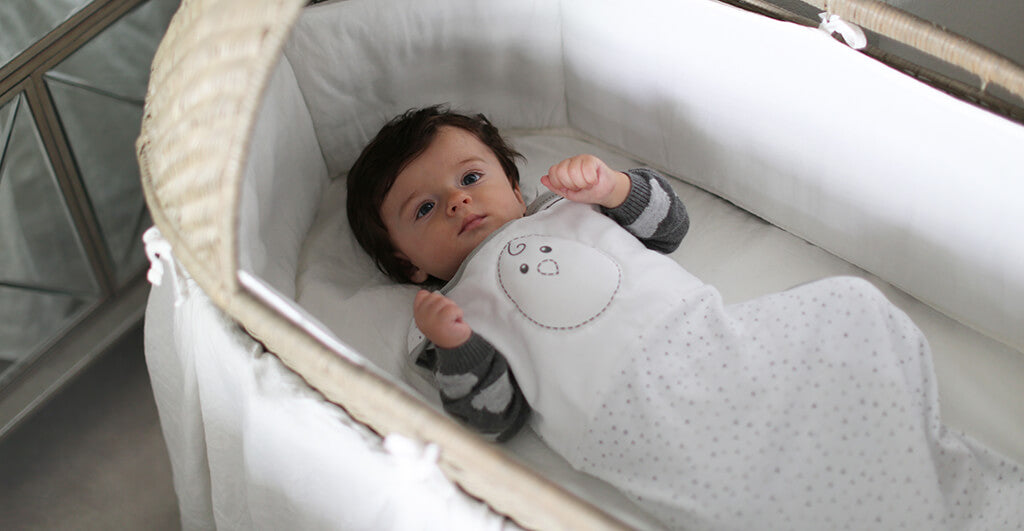Shopping Cart
Just last week you were bragging to your friends and family about what a good sleeper your baby is. All those horror stories about waking up 10 times a night to a cranky, fussy baby don't apply to you anymore. Your 2 or 3 month old is practically sleeping through the night already!
Your baby can practically fall asleep on command!
And then suddenly this week, those nightmares come to haunt you again. Your baby starts waking up frequently during the night, waking up early from naps (or refusing to nap at all) and you have no idea why or how.
|
Age |
Typical number of daily naps |
|
Newborns |
4 - 6+ naps per day |
|
3 months |
3 - 5 naps per day |
|
4 - 5 months |
3 - 4 naps per day |
|
6 months |
3 naps per day |
|
7 - 9 months |
2 - 3 naps per day |
|
10 - 13 months |
2 naps per day |
|
14 - 18 months |
1 - 2 naps per day |
|
19 - 35 months |
1 nap per day |
If this sounds unfortunately familiar, we're here to give you the low-down on everything you need to know about surviving a baby or toddler sleep regression.
In this article
What is a sleep regression?
At what ages do sleep regressions happen?
How long does a sleep regression last?
How to survive sleep regressions?
What is a sleep regression?
A sleep regression is defined as a period of time that lasts two to six weeks when a baby who was previously sleeping well experiences a temporary setback in sleep patterns.
During a regression, most babies will go from sleeping soundly to experiencing frequent night waking, being harder to calm or settle before sleep, waking up early from naps, or fighting nap times altogether.
In many cases, it’s a combination of all three – which can be extremely exhausting, not to mention frustrating for parents!
We know it probably feels like the first 12-18 months of your little one’s life is an endless whirlwind of regressions, but just remember they are natural developmental periods in your baby’s life that are helping them to grow, mature and develop. And yes, it’s going to be tough, but there are plenty of things that you can do to help you and your little one along the way. - Littleones.co
More often than not, for most babies and parents, most sleep regressions seem to come out of nowhere. Parents are usually taken by surprise when their baby goes from sleeping great one night, to barely sleeping at all the next without warning.
The most common time frames for sleep regression to occur are when the baby hits 4 months, 9 months, and/or 18 months of age.
Definition: sleep regressionA period of time that lasts two to six weeks when a baby experiences poor sleep after a history of sleeping well. Signs may include frequent night awakenings, shorter naps, fighting sleep, and extreme fussiness. |
Sleep Regression Ages
The most common sleep regressions are the 4 month sleep regression, 8 month sleep regression, and 18 month sleep regression. The 8 month sleep regression is also sometimes referred to as the 9 month sleep regression, as it can happen anytime between 8 and 10 months old.
Typically these sleep regression ages align with big developmental milestones that cause baby sleep or child sleep setbacks.
4 month sleep regression
- Most common sleep regression.
- Occurs between 8 weeks old and 5 months old.
- Caused by permanent changes to your baby's sleep cycle.
- Typically lasts between 2 and 3 weeks (usually shorter than the other sleep regressions)
- 10 Tips for Surviving the 4 Month Sleep Regression
Zen Sack™: Make the 4 month sleep
|
8 month sleep regression
- Occurs between 8 months old and 10 months old
- Caused by significant milestones. Baby is learning to crawl, sit up, pull up, absorb language, etc.
- Typically lasts between 2 and 6 weeks
- Get ahead of the 8-month sleep regression with these tips.
18 month sleep regression
- Occurs between 17 and 18 months old
- Caused by your toddler's newfound independence, separation anxiety, and/or teething.
- Typically lasts between 2 and 6 weeks
- Guide to the 18-month sleep regression.
If your little one is experiencing a regression but doesn't line up exactly with one of these ages, don't worry - because regressions are associated with certain milestones and every baby develops differently, the common periods for regressions won't always be the same for your baby.
For example, a baby who has started to crawl and pull up earlier than is expected is more likely to have the 8 month sleep regression a little earlier, maybe at 7 months.
What matters most is trying to ensure that your baby gets the amount of sleep they need in a day. For example, a 4-month-old baby will need between 12 and 15 hours of sleep split across both naps and a longer nighttime sleep.
This could mean 2 naps of 3 hours and a 6 hour stretch of sleep at night, but don't get too hung up on when this sleep should happen - as long as they're sleeping, when they're doing it isn't so important.
What to expect during a sleep regression
A decrease in sleep and an increase in fussiness/crankiness are the most common effects of a baby sleep regression. The decrease in your baby's sleep might happen during nap times, nighttime sleep, or, in some cases, both.
Zen mom zoneBrianna K. wrote: "We knew Noel was in his sleep regression phase when he stopped sleeping through the night after being a perfect sleeper. During the regression, he was extra fussy and skipping naps completely or sleeping a lot less during naps." |
It's common for your baby to be much hungrier during a sleep regression. Some parents also report that their babies are more "clingy" than normal, constantly wanting to be snuggled or held.
Baby sleep regressions usually coincide with developmental and/or physical milestone(s). So, while you’re probably very proud of your baby for learning to crawl, sit up, or seeing that first tooth pop through, these are most likely the same reasons that your little one is struggling to fall asleep.
Sleep regression causes

What specific milestones are affecting your baby’s sleep will depend on their age. Keep in mind, you might not always be able to see these milestones.
For example, the 4-month sleep regression occurs when your baby’s sleep cycle starts to change. It’s not a visible change, but a change in how often they shift from light sleep to deep sleep.
Whereas the 8-month regression can be caused by milestones like crawling and pulling up- new tricks that you’ll notice your baby trying to master.
As soon as your baby gets used to these new changes, tricks, or skills their sleeping patterns usually return to normal.
Make sleep regressions more manageableSleep regressions can last up to 6 weeks - but there are ways to make them more manageable. The Zen Swaddle® or Zen Sack™ help many parents cope during sleep regressions by helping their babies calm easier, self soothe, and sleep better. |
Some also might notice that, uncoincidentally, the most common sleep regression ages align with common nap transition periods (3 to 2 naps, 2 to 1 nap, etc.). These transitions often play a role in sleep regressions.
But whatever milestone is causing your little one's sleep regression, you'll want to get back on track so that both you and your baby sleep through the night again. Fortunately, there are plenty of tips and tricks you can use to combat a sleep regression and get back into better sleep patterns.
At what ages does sleep regression happen?
The most common sleep regression ages are 4 months, 8 months, and 18 months. The 8 month sleep regression is also sometimes referred to as the 9 month sleep regression, as it can happen anytime between 8 and 10 months old. Typically these ages align with big milestones that cause sleep setbacks.
Surviving Sleep Regression
Our number one advice for surviving sleep regressions is simple: take a deep breath and hold on to the fact that it won’t last forever.
Sleep regressions aren’t fun for anyone – you or your baby! It’s a confusing time for them, and a frustrating one for you.
Since there’s not much you can do to “stop” or “avoid” sleep regressions, focus on it being temporary, and know that your baby's sleep will settle down again soon.
Here are 9 more tips to help you survive sleep regressions:
1. Be flexible with their temporary sleep patterns..
Sleep regressions will more than likely put a stop to your normal nap schedule and bedtime routine. For the time being, you’ll need to adjust. It’s temporary…remember that when you find yourself feeling low!
2. Try to Keep Routines Consistent.
Even though sleep regressions are bound to mess up your usual schedule, you should try to keep up with performing your soothing bedtime routine before sleep. It may not happen when it normally does, but in a time where your baby is experiencing and learning new things, it helps to keep some things familiar.
This will also help settle them before putting them down for the night, especially if separation anxiety is behind them fighting sleep.
3. Keep a calming routine and environment.
Try adding a soothing massage, bath, swaddling, or storytime to your bedtime routine to keep your baby relaxed. Also, make sure their environment is soothing – the room should be dark and at a comfortable temperature. Maybe even try adding a white noise machine to help calm them and help them fall asleep.

4. Comfort them but avoid creating bad habits.
It’s okay to give those extra snuggles and spend a few extra minutes rocking your baby to help soothe them! Do what you can to offer comfort but try to limit this contact and place them in their sleep environment again.
Take care not to revert back to habits you’ve already broken and don't create new habits! Avoid regularly rocking or nursing your baby to sleep to be sure they don’t form any sleep associations that may also worsen separation anxiety.
5. Try the Zen Swaddle or Zen Sack.
The Zen Swaddle’s and Zen Sack’s lightly weighted parts can be very effective in helping a calm fussy, overtired baby sleep soundly again.
Try using the Zen Swaddle or Zen Sack during a sleep regression and you may find the added pressure helps your baby to relax and self-soothe.
Zen Sleepwear™: Helping parents survive
|
6. Alter your sleep schedule.
Sleep regressions usually mean less sleep than normal, which leads to an overtired baby, which leads to crying and fussiness, which leads to less sleep, which leads to…you get the idea. It’s a vicious cycle!
Try to avoid an exhausted baby by altering daytime sleep schedules and trying an earlier bedtime to make up for sleep lost at night.
7. Give them the fuel they need.
Don’t be afraid to give your baby those extra feedings if they are asking for them. The developmental changes and growth spurts that your baby often experiences during a sleep regression will usually increase their appetite.
8. Ask for and accept help.
While you do your best to take care of your baby during sleep regressions, remember to take care of yourself too. Sleep regression for baby often leads to sleep deprivation for parents - if your baby can't fall asleep, neither can you.
If you’re able to, take shifts with your partner. Call on friends and family to take over for a bit so you can get some rest. And when someone offers to give you a hand, do yourself a favor and take it!
9. Support Group.
Talk to a mom who’s been through it before – create a support group. It helps to know others that have gone through a baby sleep regression and know that there is light at the end of the tunnel.
If you don’t know another mom who’s been through a sleep regression, take some advice from some of our customers in the Zen Mom Zone!
Sleep Regression Survival Tips/ or keep Zen Mom Zone
Zen mom zone“She may be on the verge on a milestone. My little guy is getting over a regression caused by learning to walk. Make sure that during the day she gets plenty of time to work on her new skill." - Mandie G., 1/30/18 "Just keep thinking it'll pass, load up on coffee or tea, try to trade out night duty with a partner every few days if possible. And to help the baby, use white noise or a calming classical music CD on repeat throughout the night." - Jessica M., 2/25/18 "Consistency is key! We tried the best we could to stay on our schedules and the regression eventually passed. If you are feeling overwhelmed, don't be afraid to ask for help." - Brianna K., 1/30/18 "Keep your sanity by letting people help you if they can, even for a little bit it's amazing what some 'me' time can do for you." - Eileen R., 1/30/18 |

Sweeter Sleep Story“4 month sleep regression...who knew it could be so awful! After 2 nights of waking up hourly and comfort nursing literally all night and him not wanting to be put down during the day, I broke out our [Zen] sacks. He's been asleep for 3 straight hours so far! I'm a Nested Bean believer!" - Chelsea W., 1/1/2018 The Zen Sack is gently weighted to help babies self soothe. It helped Chelsea's little one sleep better. It could help your baby, too. |
Zen mom zoneMandie G. wrote: "Regressions tend to happen whenever there is a new skill milestone. With our little guy, it has been like clockwork - learned to roll, learned to crawl, learned to walk...any big milestone comes with a sleep regression. And back to normal right after!" |
Baby won’t sleep? No problem.
If you’re still struggling to get your baby to sleep through the night, then it might be time to try a weighted sleep sack. Even if your baby isn’t dependent on sleeping in your arms, the comforting pads help soothe your baby to sleep.
Nested Bean weighted sleep sacks help babies’ sleep longer (which means the whole family sleeps more) by strategically placed weighted pads that apply Deep Touch Pressure (DTP) in areas where babies are naturally held.
Plus, every sleep sack features zipper covers, soft tags, and cozy seams to minimize irritation and sensory discomfort.
Want to learn more? Click here
Other Sleep Resources
WonderBaby.org: Common Baby Sleep Regression Ages
Zerotothree.Org: Coping with Sleep Challenges
Healthychildren.Org: How to Keep Your Sleeping Baby Safe
You Might Also Like...
10 Tips for Surviving the 4 Month Sleep Regression
6 months sleep regression: 5 common myths debunked
When Do Babies Sleep Through the Night and What Might Be Preventing It?


